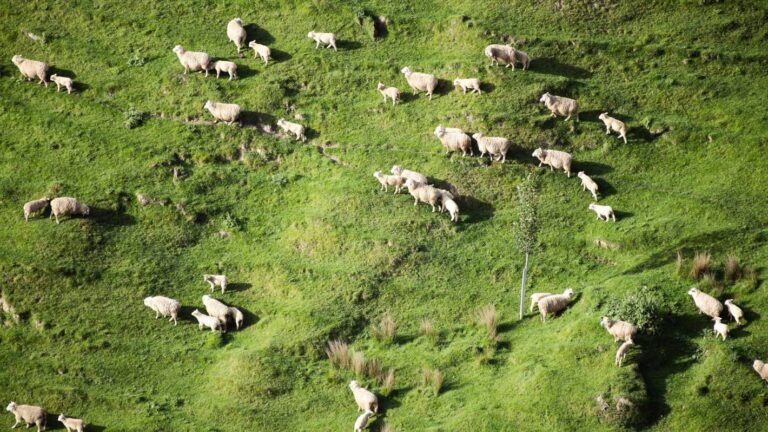
Sophie and Sam Hurley, of sheep and cattle farm Papanui Estate in Taihape, say their ethical luggage and bags business has the potential to turn around the ailing price of wool.
Wool prices have “nose-dived” in recent years, with prices as low as a third of what they were five years ago.
The pair, who live and work on the three-generation farm, produce 170 tonnes of wool from their 25,000 ewes to create about 22,000 high-end handbags, holdalls, purses and totes annually.
Honest Wolf began in early 2020 as a way to rustle up a better price for their wool at the farm gate and in the hopes to bring about change in the fashion and textiles industries.
The Hurleys are located on the hill country portion of the 3300-hectare farm, looking after the animal breeding programme, running the business around the farm and their two young children.
READ MORE:
* APEC 2021: When a gift is more than a gift
* Moral fibre: Why sheep farmers want Kiwis to take another look at wool
* Nadia Lim: why we should care more about wool
The idea for the venture came about in 2018 and launched two years later. Fast-forward four years, Honest Wolf recently opened a flagship retail store in Hunterville and has experienced triple-digit growth, which it puts down to a renewed appreciation for woollen products.
Sophie Hurley said New Zealand’s wool industry was in decline when the business launched but they saw opportunities to turn that around. Honest Wolf, like other businesses, had identified new ways to use wool, she said.
“When plastic bags were being phased out of the country, as well as the industry in decline, we saw a new way to use our wool and to replace those plastic shopping bags. From there our ideas grew that we could make a whole range of luggage and accessories using our wool.”
Before Honest Wolf, the Hurleys’ wool was being used to make carpets.
“The price was getting worse and worse for wool, and we wanted to use it in a new way – put it into products that we saw a future in, that didn’t have a sustainable option currently, that was a better use for our wool.”
Supplied
Honest Wolf’s first retail store opened on State Highway 1 in Hunterville in July.
Honest Wolf currently uses just 30% of the 170 tonnes of wool it produces on its farm.
It hopes to grow to be able to use all of its own wool – as well as others’ wool – long term as the business grows, with the goal to help farmers get a better farmgate price.
The business sees itself as a champion for the country’s wool industry and hoped to inspire other people to get innovative with wool to help revive the wool industry.
Hurley said the natural qualities of wool made it an ideal fibre to create almost anything from.
“We see the fibre as a solution to so many items to replace plastic.
“All the talk of wool in the last few years has been negative, but we see a positive turnaround for it.”
Aside from overnight totes, bags, wool caps and laptop sleeves, Honest Wolf has been working on a woollen product outside of bags and apparel.
The undisclosed item, which is being kept under wraps for now, is expected to launch in time for winter.
Supplied
Sam and Sophie Hurley, the founders of Honest Wolf, with their son, Harry.
Honest Wolf is on track to increase sales by 90% this year, following growth of more than 170% last year.
The business plans to open a network of stores, including in the South Island and Auckland.
For now, it had decided against stockists and to sell its product direct, Hurley said.
“We wanted to sell our story ourselves and don’t want that to be lost in the wholesale market.”
Supplied
Sophie Hurley says wool is having its moment on the world stage and will soon reflect farm gate prices.
Hurley said the business had gone from strength to strength and she had not expected it to grow as fast as it had.
“We saw a good opportunity but didn’t expect it to have the growth that it did so quickly. Alongside the New Zealand wool story and small business, and the support other businesses too have probably seen through Covid times, has helped us get to where we are.
“Now we just want to continue growing and expand internationally when the time is right.”
It takes roughly six months for each Honest Wolf bag to be made.
The wool is shorn off their sheep twice a year. The wool is then felted, so once cleaned in Hawke’s Bay it gets sent via sea freight to India, where it is dyed and made into woollen felt. From there the felt is stitched alongside New Zealand leather and shipped back to Hunterville.
Supplied
Honest Wolf sees itself as a champion of New Zealand wool, and its store stocks others’ products outside its range.
Honest Wolf is exploring how it could manufacture wool felt and have its bags made in New Zealand.
Hurley said she believed the wool industry was having a moment of appreciation on the world stage, helped by the likes of popular shoe company Allbirds and this would soon flow through and be reflected in farmgate prices.
“There are a lot of people trying to bring out new things with wool and what’s letting people down is the manufacturing options in New Zealand, but once you get past that there are some incredible ideas that people have got – if people can get these ideas into fruition there are so many options for wool.”